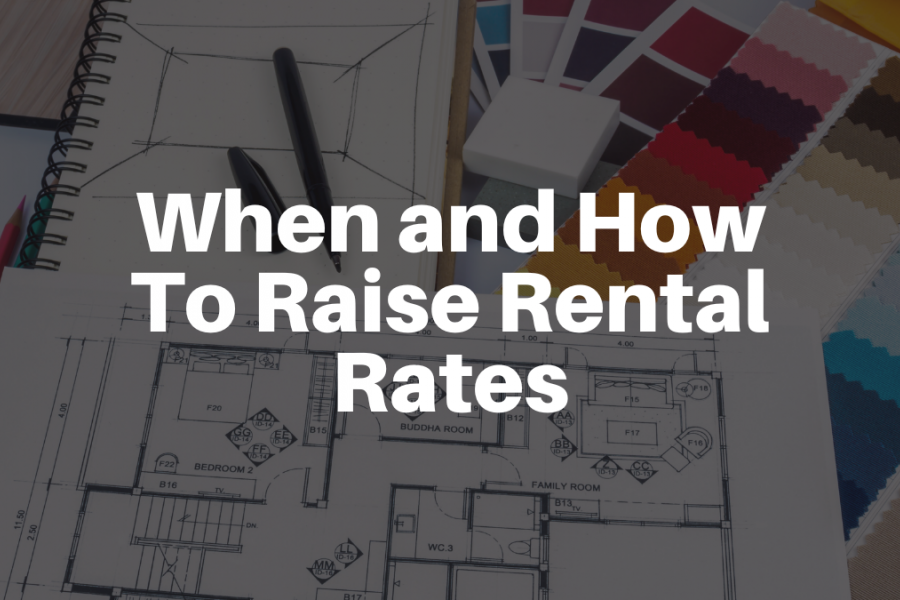When and How To Raise Rental Rates

As property costs rise, landlords sometimes need to raise their rental prices to make up for operating expenses. Otherwise, investment returns can be reduced drastically.
However, landlords often hesitate even when it is justified, especially if they have a good tenant who treats their property well and pays on time.
Some of the factors that you need to consider before raising the rent of your property are the following:
- The market value of the rental properties in your neighborhood
- The rates of vacancy
- The capacity of renters to pay the new rate
Your renter may not renew the lease when it is above what they are willing to pay for, so you need to learn how to introduce a rental price hike without it being too jarring. Check out the process we outlined below to make the rental rate increase as smooth as possible.
Be Familiar With Your Local Rental Laws
Each state can differ when it comes to rental laws. That is why you need to update yourself, especially if you are a long-distance landlord whose rental investment is in another state. Know that both state and local laws can also vary in regards to raising rent.
Some areas may not allow raising the rent, while in other cities, there may be a cap. It is important to conduct prior research on local rent control laws first before adjusting your rental price.
A “for rent” sign in front of a house.
Include The Potential Rent Increases In The Lease Agreement
If the place your property is located does not prohibit rental rate hikes, then renters might not be surprised when your rental price goes up. However, it does not mean that you must neglect to inform them beforehand.
You can provide the rental raise information in the written lease agreement to prevent strong reactions and prepare the residents ahead of time. Be detailed when including it in the contract. Mention the percentage of the rent increase or the full rental amount.
Make sure to guide the renters on the next steps if they intend to renew or not to renew. Be specific about the notice period that renters must provide if they plan to continue their tenancy or not. This is to give ample time for preparation.
Assess The Possible Rental Rate Increase
You’ll have to evaluate the market value of similar properties in the neighborhood. Raising the rent without doing this can backfire since you may overprice your rental or underprice it. It is best to adjust your rental price accordingly.
If you have a two-bedroom apartment priced at $2,000, you must find other units with the same amenities for comparison. If the rental price for that property type is $2,500, pushing the rate to $3,000 will not make your rental competitive, and you may lose potential and current renters to other rental places in your neighborhood.
A living room with exposed brick walls.
You also have to consider the rate of vacancies. Are many similar apartments unoccupied in your neighborhood? Is it hard to attract new renters to your other properties? Or are the vacancies low in your area due to high rental demand? Knowing this can help you decide whether to increase the rental rate or not.
Stay cautious before raising your rental price. Remember that extreme hiking of the rate just because all the rental units in your area are priced at a certain amount can also fail. Your current renters may be upset when they learn that the rental rate has moved up dramatically. It is best to make progressive rental increases.
A safe rental rate increase is typically 3% to 5% but this will largely depend on your specific situation, market demand, competition, and local rent laws.
Perform Rental Renovations And Be Diligent In Maintaining The Rental Unit
Upgrading your rental unit can encourage renters to renew their lease. Adjusting your rental rate higher can be justified easily to cover the renovation costs. However, if there are a lot of property issues you have not dealt with and delays in repairs, increasing the rent may be met with strong resistance from your renters.
A selection of paint and countertop samples.
Unattended maintenance requests can be brought up when you inform the renters of a potential rental hike, which can lead to disputes and non-renewal of the lease. Inspire renters to renew by continually upgrading your rental place and creating a comfortable living space for them.
Consult your renters! They may have made suggestions for improvement that you can consider to encourage them to sign a renewal.
Give A Notice To The Renters
After setting the new rental price, you need to notify your tenants in advance. A 40-day or 60-day window before the tenancy expires is a good period to set. Renters may make requests and you have to be ready and willing to make allowances.
They may ask you to repaint the unit, replace appliances with newer energy-efficient models, or other value-adding advantages. It is worth considering, as you want to continue building a good relationship with your renters while achieving the rate of increase that can create consistent investment returns for you.
After mutually agreeing, make sure to keep a signed and dated notice of the rental increase to organize your rental documents.
Bottom Line
Doing the above steps can make the rental price increase adjustment reasonable. Landlords must avoid spontaneous price hikes to retain tenants given that competition is always lurking. Long-term renters contribute to a stable income.
You can also hire a property manager to perform this procedure on your behalf. Contact Evolve Real Estate and Property Management today!
